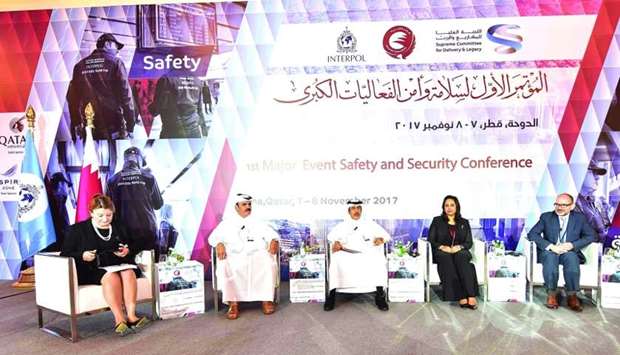No country can fight terrorists or terrorism alone, a senior Qatari official, who has held several positions concerned with the regional security affairs, said.
Major General Hazza bin Mubarak al-Hajrey was speaking at a panel at the opening of the 1st Major Events Safety and Security Conference.
While highlighting the importance of strengthening security and safety for the success of major events al-Hajrey said there is greater need of sharing information and transfer of skills and know-how among the Interpol members.
The Qatari official is the assistant secretary general of the Co-operation Council for the Arab States of the Gulf Security Affairs.
While acknowledging that there are safety and security issues for the conduct of every major event, whether it is sport or non-sport, the senior Ministry of Interior (MoI) said terrorism is a global issue with no boundaries and is affecting the whole world.
Equally dangerous and challenging is the issue of drugs, he said while highlighting the need to fight the producers as well as their carriers.
"What is important is how we successfully fight such nefarious elements working everywhere to disturb public safety and security," said Major General al-Hajery.
The MoI official also recalled the impact of terrorist attacks on sport events in different parts of the world and how it affected the conduct of international events in places where such incidents broke out.
Speaking later, Brigadier Ibrahim al-Mohannadi asserted that Qatar has stood against all sorts of terrorism and also reminded the gathering that the country has put in place an important legislation on the issue. Qatar, he said, is committed to all counter terrorism measures and its financing and taking pro-active steps in this direction.
The role played by the country's anti-money laundering and terrorism financing committee was also highlighted by the official, a member of the Supreme Committee for Delivery and Legacy's Security Committee and head of the Consultancy Unit. A permanent representative of Qatar at the Council of Europe, the official said the bilateral agreements signed by Qatar with different countries over the issue of terrorism have proved to the world that the country has never compromised on the issue of security and safety.
The Qatari official also recalled the formation of a specialised unit for cyber security in the country and the unit's close co-operation with acclaimed bodies from the UK and the US. He specifically remembered the safety and security training programmes attended by officials from Qatar and how they would help the country develop a trained team to handle those areas where they received expertise.
Later, a senior faculty from Singapore's Nanyang Technological University spoke on current and emerging IS-centric threat to international events. Deputy Head of International Centre for Political Violence and Terrorism Research at the Singapore university Dr Jolene Jerard said the four core elements of any terrorist threat are Volatility, Uncertainty, Complexity and Ambiguity (VUCA). At the same time, a unified VUCA (Vision, Understanding, Clarity, and Agility) approach by member countries would help hosts of any major event effectively counter terrorist threat, she said.
The session moderated by security advisor of the Supreme Committee for Delivery and Legacy's Security Advisor Janet Williams also featured two other specialised speakers, Filippo Dispenza and Andrew Glazzard.
Dispenza is the director at the Italy's Central Directorate of General Affairs while Glazzard is the director of the National Security and Resilence Royal Services Institute for Defence and Security Studies (UK).

